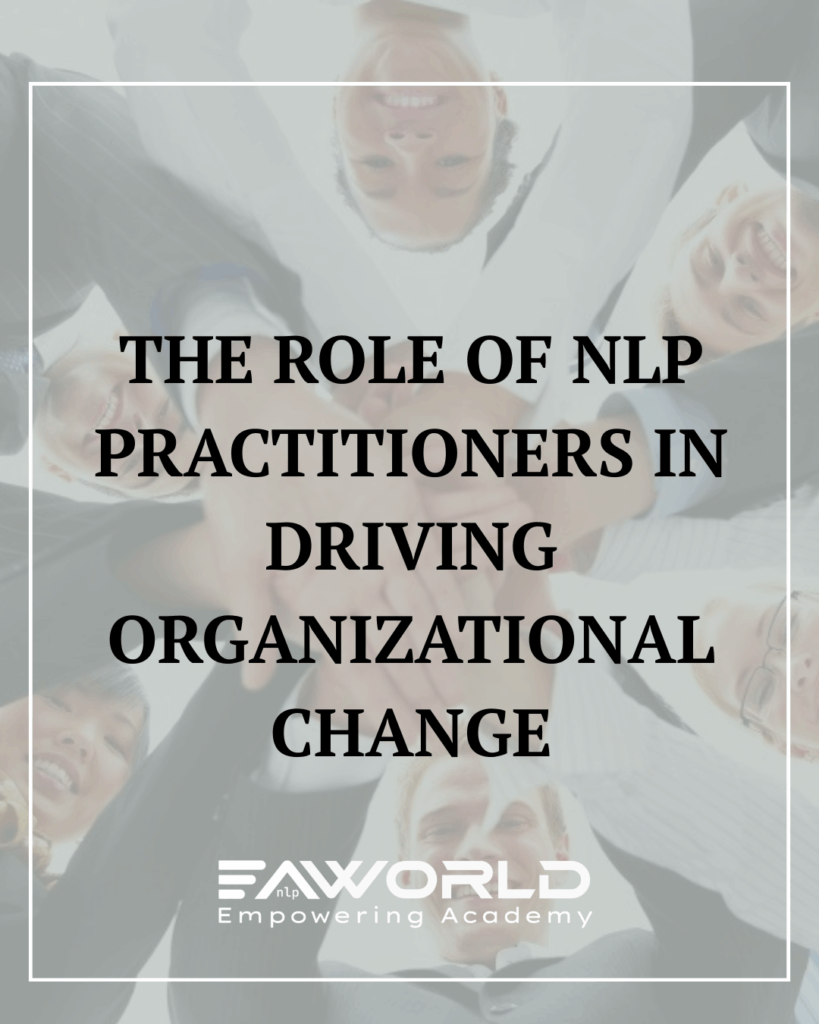
Traditional leadership methods often fall short in addressing the emotional, behavioral, and communication challenges that accompany transformation. This is where NLP Practitioners—professionals trained in Neuro-Linguistic Programming techniques—play a pivotal role in guiding leaders, teams, and entire organizations through meaningful and sustainable change. More than just coaches, NLP practitioners bring a unique blend of psychological insight, communication mastery, and practical strategies that unlock human potential and drive cultural transformation within businesses.
Understanding the Role of NLP Practitioners in Business Transformation
An NLP Practitioner is trained to apply neuro-linguistic programming strategies that reframe thinking patterns, influence communication, and align behaviors with organizational goals. Unlike generic change consultants, NLP Practitioners focus on the human side of organizational change—helping leaders, managers, and employees build resilience, adapt their mindset, and create collaborative environments where change is embraced rather than resisted.
For executives, this means accessing a powerful toolkit for leadership development that directly addresses challenges such as resistance to change, communication breakdowns, and disengaged employees. By embedding NLP into leadership coaching and organizational development, companies are able to create long-lasting cultural shifts that align with business objectives.
Why Organizations Need NLP Practitioners for Change Initiatives
- Shaping Leadership Mindsets for Change
NLP Practitioners work with executives and managers to uncover limiting beliefs and reframe them into empowering perspectives. This mindset coaching is essential for leaders who must communicate vision, manage uncertainty, and inspire their teams during transitions. - Enhancing Communication Across Teams
Effective communication is the foundation of organizational transformation. NLP techniques—such as language reframing, active listening, and rapport-building—help managers communicate change in ways that reduce fear, build trust, and encourage employee engagement. - Overcoming Resistance to Change
One of the most significant barriers to organizational change is employee resistance. NLP Practitioners are skilled at identifying the unconscious fears driving this resistance and guiding employees to adopt more constructive and forward-looking perspectives.
Embedding Cultural Alignment
Organizational culture often determines whether transformation succeeds or fails. NLP Practitioners help HR leaders and executives design culture change programs that align employee values, behaviors, and communication styles with the company’s long-term strategy.- Shaping Leadership Mindsets for Change
Applications of NLP Practitioners in Driving Organizational Change
1. Leadership Development and Executive Coaching
Organizations increasingly rely on executive coaching programs with NLP Practitioners to build critical leadership skills. These programs enhance executive presence, emotional intelligence, decision-making, and adaptability—qualities that are indispensable for leaders navigating complex business environments.
2. Team Cohesion and Conflict Resolution
Using NLP effective communication techniques, practitioners help teams improve collaboration, manage conflict constructively, and foster trust. This not only reduces workplace friction but also accelerates innovation and productivity.
3. Change Communication Strategies
NLP Practitioners are often engaged as part of organizational change management programs to design communication strategies that resonate with different personality types. This ensures that messages about change are clearly understood and positively received.
4. Employee Engagement and Retention
Through performance coaching, relationship coaching, and mindset coaching, NLP Practitioners support employee growth and resilience. Engaged employees are more likely to stay, adapt, and contribute to organizational success—directly impacting retention strategies.
The Strategic Value of NLP in Complex Organizations
Beyond individual coaching or team interventions, NLP Practitioners deliver enterprise-level value by embedding psychological safety, trust, and agility into the fabric of the organization. In global and multicultural organizations, where communication styles often clash, NLP bridges cultural divides and creates shared understanding. For executives managing mergers, acquisitions, or restructuring, NLP provides frameworks to manage uncertainty, preserve morale, and build alignment around a shared vision.
Most importantly, NLP is not just about “soft skills”—it’s a performance-driven methodology. By shifting internal narratives and optimizing communication, organizations see measurable outcomes such as faster decision-making, stronger stakeholder alignment, higher innovation output, and greater adaptability to market pressures. In times of disruption, these are not optional capabilities—they are survival tools.
Companies that invest in NLP coaching and training report measurable improvements in employee satisfaction, leadership effectiveness, and overall organizational performance. Long-term benefits include:
- Greater adaptability to market changes
- Reduced turnover and higher employee retention
- Improved collaboration and team cohesion
- Higher levels of innovation and problem-solving
- Stronger alignment between organizational culture and business strategy
In short, NLP Practitioners help businesses build organizations that are not only agile but also emotionally intelligent—capable of thriving in today’s unpredictable business environment.

